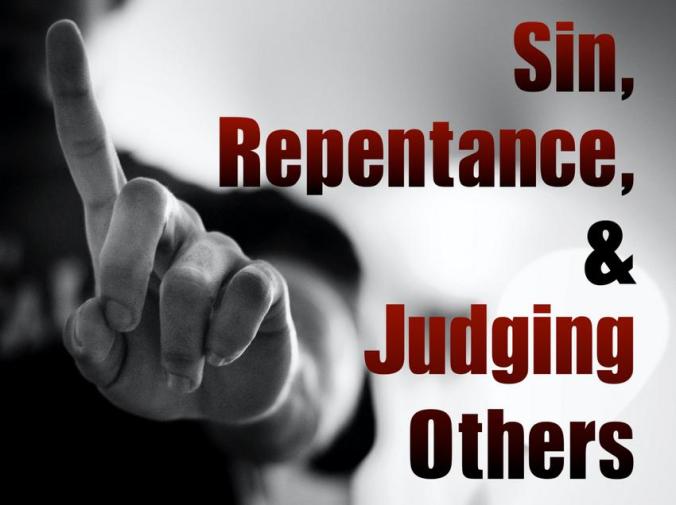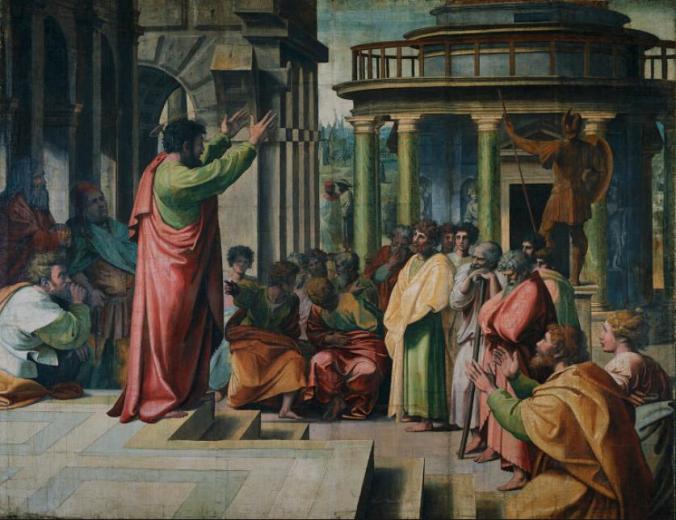“Go therefore and make disciples of all the nations…teaching them to observe all that I commanded you; and lo, I am with you always, even to the end of the age” (Matthew 28:19-20, NASB).
——————–
Contents:
1) Does Romans Call for the Death of Homosexuals? (Doy Moyer)
——————–

-1-
Does Romans Call for the Death of Homosexuals?
Doy Moyer
Bad interpretations can have devastating consequences. This is especially seen in the recent debates regarding the LGBT movement and the push to get those who oppose the practices to bow to the movement and, not just tolerate it, but affirm and condone it. A good example of the “bad interpretation” problem is seen in an article published on Roll Call. The headline says, “Homosexuals ‘Worthy of Death’ Bible Verse Read Before Key Note.” Rep. George Allen led a prayer by reading first from Romans 1:18-32. This, of course, has been condemned as being “vile and dangerous remarks,” and accuses Allen of spreading hate. The author writes, “Passages in the verses refer to homosexuality and the penalty for homosexual behavior.” This was interpreted to mean that those present “heard a Bible verse that calls for death for homosexuals.”
This is not about the circumstances in which the prayer was made or the political ramifications of what they were voting on, but rather how a Bible verse interpreted so badly can do more damage in the minds of the interpreters than can ever be warranted. The fault lies not with Scripture, but with horrific interpretive lenses based on political agendas rather than sound theology. We often make the point that people can make the Bible say anything they want if they are willing to twist things, and this is another case in point. Only this time it is not to allow for a practice that is desirable, but rather to try to show how a Bible passage spreads hatred by calling for practicing homosexuals to die.
Interestingly (though not funny), the same people who now say that this Bible reading calls for the death (i.e., execution) of homosexuals would have also told Bible believers that the Bible nowhere condemns homosexual behavior and should not be seen as a barrier to the acceptance of the LGBT agenda. Which is it? The fact that they react so strongly to Romans 1 shows that they know that Scripture does not condone homosexual practice. Now they take this another step by saying that the passage calls for their deaths. If they can make this stick, then they will have sufficient political warrant to ban Scripture altogether because it foments hatred and violence against the LGBT community. Just watch.
Not so fast. A careful reading of the text, coupled with a careful notation of the context of Romans, shows that the book does not in any way “call for the death” of homosexuals. It does show that the practice is sinful, so what does the whole “worthy of death” phrase mean in verse 32?
First, whether this passage is referring to spiritual or physical death is debated (I believe it is spiritual), but even if physical death is under view, it is not a call for others to take such action. That, in fact, goes against the whole message of Romans, which prohibits any individual from taking personal vengeance or harming anyone else (read chapters 12-13). It would simply be saying that sinners are “worthy” of it without calling for violent action against the practitioners. There is a difference, and the passage cannot rightly be interpreted as some kind of overarching call to kill anyone. In other words, it does not mean “kill those who do this,” and any interpretation that makes it say that is doing extreme violence to the text. Let’s pray that no believer would actually take it that way. The point is that we all know that death is a horrible consequence of sin.
Second, the point being made is not that certain people need to die. Paul is setting up a bigger argument here, and the text cannot be rightly interpreted in isolation. I wonder how many who are reading this passage as a “call for death” have actually studied Romans as a whole and seen the overarching context of Paul’s argument. It is unconscionable that anyone who has done this would ever come up with the interpretive spin being put on this text for political purposes.
Third, please notice in the reading of Romans 1:18-32 that those who engage in homosexual practices are not the only ones in the list: “God gave them over to a depraved mind, to do those things which are not proper, being filled with all unrighteousness, wickedness, greed, evil; full of envy, murder, strife, deceit, malice; they are gossips, slanderers, haters of God, insolent, arrogant, boastful, inventors of evil, disobedient to parents, without understanding, untrustworthy, unloving, unmerciful” (vv. 28-31).
If this is meant to be a “call for death” for homosexuals, then it is also a “call for death” for everyone who has ever been unrighteous, wicked, greedy, evil, envious, deceitful, malicious, murderous, and full of strife. This includes gossips, slanderers, the boastful, and the unmerciful. You get the point. Who among us is not in that same list somewhere? If this is meant to say that homosexuals ought to be executed, then it is meant to say that all of us ought to be executed. And then, no one would be left. But the truth stands: all of us are “worthy of death.” Romans 1:32 uses the legal term, “decree.” If we are standing on trial, we know the decree, and we know the penalty for violation. We are all guilty. None are righteous (Rom. 3:10).
This brings us to the point that Paul is really making. Sin makes everyone — EVERYONE — worthy of death. That includes me and you, straight or gay, male or female, American or otherwise. “All have sinned and fall short of the glory of God” (Rom. 3:23), and “the wages of sin is death” (Rom. 6:23a). To crook our fingers only over to homosexual behavior, then to act smugly like we don’t fit into that same passage, is to make the same grave mistake that many back then made:
“Therefore you have no excuse, everyone of you who passes judgment, for in that which you judge another, you condemn yourself; for you who judge practice the same things. And we know that the judgment of God rightly falls upon those who practice such things. But do you suppose this, O man, when you pass judgment on those who practice such things and do the same yourself, that you will escape the judgment of God?” (Rom. 2:1-3)
But if all of us are worthy of death, then why is Paul writing Romans? Look, this is not a full exegesis of Romans, and I know all too well that there are debates over the interpretation of the whole book, but I hope we can all agree on this point. Paul wrote Romans in order to show that, even though all of us are worthy of death because of sin, God enacted another plan that changes the outcome of this problem. Paul wasn’t writing this in order to lay out the penalty that all should have known (sin causes death), but was writing in order to show the solution of grace. Legally, God can condemn us, but that’s not what He wants to do. Romans 1 is part of the set up to show how everyone is guilty, but God wasn’t willing to leave it at that.
“For all have sinned and fall short of the glory of God, being justified as a gift by His grace through the redemption which is in Christ Jesus (Rom. 3:23-24).
“Therefore what benefit were you then deriving from the things of which you are now ashamed? For the outcome of those things is death. But now having been freed from sin and enslaved to God, you derive your benefit, resulting in sanctification, and the outcome, eternal life. For the wages of sin is death, but the free gift of God is eternal life in Christ Jesus our Lord” (Rom. 6:21-23).
Paul speaks of death multiple times in Romans, but he does this in order to demonstrate how God delivers sinners from death through His grace. In other words, Romans is a textbook gospel message, and even before he speaks of anyone being “worthy of death,” he has already proclaimed, “For I am not ashamed of the gospel, for it is the power of God for salvation to everyone who believes, to the Jew first and also to the Greek. For in it the righteousness of God is revealed from faith to faith; as it is written, ‘But the righteous man shall live by faith’” (1:16-17).
In other words, we must not read any of the “worthy of death” language without also seeing God’s offer of grace, of which we are not worthy. God is willing to exchange what we are worthy of (death) for what we are not worthy of (grace, salvation). Thank the Lord for this!
Yet none of that should be mistaken for thinking that we can continue to do whatever we wish. The gospel is a message of salvation, but it is also a message of repentance from that which makes us all worthy of death. “Or do you think lightly of the riches of His kindness and tolerance and patience, not knowing that the kindness of God leads you to repentance?” (Rom. 2:4)
If God’s patience, kindness, and grace does not lead us to repent, then we only have ourselves to blame for the outcome. We are all guilty. We are all deserving of death. We are all sinners in need of God’s mercy. Paul’s argument in Romans presents a beautiful picture of the grace of God, into which, through faith, we may gain access.
“Therefore, having been justified by faith, we have peace with God through our Lord Jesus Christ, through whom also we have obtained our introduction by faith into this grace in which we stand; and we exult in hope of the glory of God” (Rom. 5:1-2).
Please drop the horrible interpretations that foster only political agendas and divisions. See the book for what it is: a mature theology of God’s grace for those who otherwise could only see death because of sin. It’s for all of us.
— Via Doy Moyer’s facebook timeline, June 18, 2016
——————–
Steps That Lead to Eternal Salvation
1) Hear the gospel, for that is how faith comes (Rom. 10:17; John 20:30,31).
2) Believe in the deity of Christ (John 8:24; John 3:18).
3) Repent of sins (Luke 13:5; Acts 17:30).
4) Confess faith in Christ (Rom. 10:9,10; Acts 8:36-38).
5) Be baptized in water for the remission of sins (Mark 16:16; Acts 2:38; 22:16; Rom. 6:3,4; Gal. 3:26,27; 1 Pet. 3:21).
6) Continue in the faith, living for the Lord; for, if not, salvation can be lost (Heb. 10:36-39; Rev. 2:10; 2 Pet. 2:20-22).
——————–
Tebeau Street
CHURCH OF CHRIST
1402 Tebeau Street, Waycross, GA 31501
Sunday services: 9:00 AM (Bible class); 10 AM & 5 PM (worship)
Wednesday: 7 PM (Bible class)
evangelist/editor: Tom Edwards (912) 281-9917
Tom@ThomasTEdwards.com
http://thomastedwards.com/go (Older version of Gospel Observer website without pictures)
http://ThomasTEdwards.com/audioser.html (audio sermons)


















